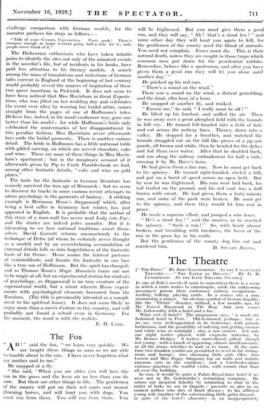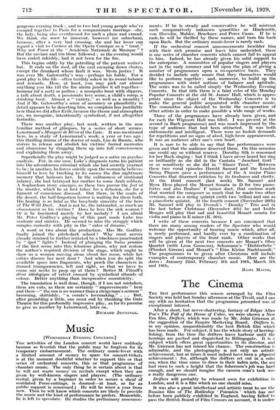The Theatre
THE ROOF." BY JOHN GALSWORTH V. AT THE VA UDEV LLE
THEATRE.-" THE EATER OF DR EA M BY Il. LENORMAND. AT THE GATE THEATRE CHID.] IN one of Zola's novels (I seem to remember) there is a scene in which a train rushes to catastrophe, while the unknowing passengers pursue their customary railway occupations— reading,. talking, playing cards. In a corner sits a nun, murmuring a prayer. An obvious symbol of human fragility, like the ` Titanic' disaster, utilized, a few months ago, by Mr. Ernest Raymond in The Berg. And now comes Mr. Galsworthy with a hotel and a fire. What sort of hotel Y The programme says. " a small old- fashioned hotel in Paris." Old-fashioned, perhaps ; but, as we see, very well-appointed in its bedrooms, with private bathrooms, and the possibility of ordering and getting caviare and white wine at midnight ; also, a rare cuisine. Yet only one night waiter—played, with exquisite reticence, by Mr. Horace Hodges. A waiter, marvellously gifted—though not young—with a knack of appearing, almost simultaneously, at all the doors, whether to wait or to warn. At the same time two drunken youths are permitted to revel in the dining- room and lounge ; two charming little girls (Miss Ann Casson and Miss Peggy Simpson) rap on walls and imitate amorous cats in the corridors ; and a Czechoslovakian virtuoso practises the wailful violin, with sounds that float all over the building. In sum, it would be quite a Palais Royal-farce hotel if we were not in Mr. Galsworthy's restraining company. lie sobers our incipient hilarity by reminding us that in the midst of larks we are in tragedy ; presents us also to an earnest author who dies of heart disease ; to his afflicted young wife (mother of the caterwauling little.girls) dressed-- in spite of the hotel's obscurity— in an inappropriately gorgeous evening frock ; and to two bad young people who've escaped together to Paris for a companionate marriage—she, the lady, being also overdressed for such a place and errand. We think she must be innocent, however (or suburban), because, after a very bad crossing, she and her lover can regard a visit to Carmen at the Opera Comique as a " treat." Why not Faust at the " Academie Nationale de Musique " ? But the caviare and via blanc followed ; so the .evening would. have ended rakishly, had it not been for the fire.
This begins oddly by the petrolling of the patient waiter's hat. It ends on the roof, all the cast escaping down chutes, except the drunkard whose fault it was. Stem justice ! It was ever Mr. Galsworthy's way—perhaps his foible. For a good play is like life—often terribly askew in its moral balance and rewards. Here, at least, you may pick out almost anything you like till the fire alarm jumbles it all together— humour (of a sort) or pathos ; a mosquito hunt with slippers, a talk about death, a passionate love scene, a child's romp, a drinking bout. Almost a " variety," as well as a morality ! And if Mr. Galsworthy's sense of accuracy or plausibility in detail appears to be deserting him, we complain less justifiably here than we did after Exile, because the theme and atmosphere are, we recognize, intentionally symbolical, if not altogether fantastic.
There was another play, last week, written in the now familiar method of glimpses, by a series of short scenes : Lenormand's Mangeur de Reyes at the Gate. It was mentioned here, in a study of Lenormand's work, a year or two agd this thrilling drama of the doctor of souls, Luc de Bronte, who strives to release and abolish his victims' buried memories and obsessions by dragging them up into full consciousness and explaining them away.
Superficially the play might be judged as a satire on psycho= analysis. For, in one case, Luke's diagnosis turns his patient into the adventurous criminal which she had secretly yearned to be ; in another, he forces suicide upon the woman he believes himself to love by tracking to its source the dim nightmare memory that harasses her. In the callousness of irrational infancy, she had betrayed her mother to some Arab robbers. A Sophoclean irony emerges, as these two pursue the fact of the murder, which he at first takes for a delusion, she for a figment of conscience diseased. Out there, in the sands of the desert, the half-forgotten horror is waiting for them both. His healing is as fatal as the busybody sincerity of the hero of The Wild Duck. And is not he, the rationalist, as much an obsessionist as his victims ? Does he love the sick woman ? Or is he fascinated merely by her malady ? I am afraid Mr. Peter Godfrey's playing of this part made Luke too sardonic and sinister. He seemed to miss the struggle which mingles curiosity with pity in the " eater of dreams."
A word or two about the production. Has Mr. Godfrey finally joined the pitch-dark school ? Why must nerves already strained be further irritated by a blackness punctuated by " spot "- lights ? Instead of plunging the Swiss pension of the first scene into this felonious gloom, why not restore the author's required division of the stage, which ought to show us a woman moving alone about her room, while her critics discuss her next door ? And when. You do split the available space into fragments, why perch the characters in franied transparencies, left and right, so tha,t we have to crane our necks to peep up at them ? Better M. Pitoeff's decor ide:ologique of velvet crossed by symbolical ribands of colour. Better anything than inexpressive eccentricity.
The translation is- well done, though, if I am not mistaken, there are cuts, as there are certainly " improvements " here and there—" the sun is no warmer than a clergyman's sermon " becoming, skittishly, " a curate's lovemaking. . . . But, after grumbling a little, one must end by thanking the Gate Theatre for this profoundly impressive play, as for its promise to give us another by Lenormand, later on.
RICHARD JENNINGS.









































 Previous page
Previous page